David Kudler's Blog, page 20
August 18, 2013
Kindle for PC (Win8) — Bug or Feature
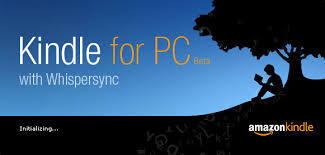
This is a bit technical; forgive me.
So, the Kindle app for Windows 8 doesn’t seem to accept “personal” documents. That includes the PDFs and such that one can read on other Kindle platforms; it also includes .mobi files sold through retailers other than Amazon.
Bug or feature?
If a bug, how badly do we want them to fix it?
If a “feature,” do we think that we’ll see it spread to other Kindle platforms? And how can we discourage that?
I’m a little worried — as someone who sells Kindle-compatible .mobi ebooks on other sites (including my own) — that our monopolistic friends are closing the sandbox.
Anyone else have any thoughts?
August 7, 2013
Gods & Games – Now Available!
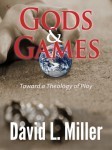
August 8, 2018 — Stillpoint Digital Press announces the release of a new ebook edition David L. Miller’s classic, thought-provoking reconciliation of religion and play, Gods & Games: Toward a Theology of Religion.
A deeply thoughtful, deeply irreverent look at the mythology of play, Gods and Games ties together Joseph Campbell’s approach to myth and religion with Johan Huizinga’s view of our species as Homo ludens — “Man the Game-player” — which suggests that play is a central aspect of the human spirit and human culture.
“A comprehensive and clear review…. loaded with quotations both pertinent and entertaining that may be eye-openers both to traditional religionists and readers who may never have thought about play in a philosophical or religious sense.” —Publishers Weekly
July 31, 2013
The Cuckoo’s Call: Great first book by best-selling author
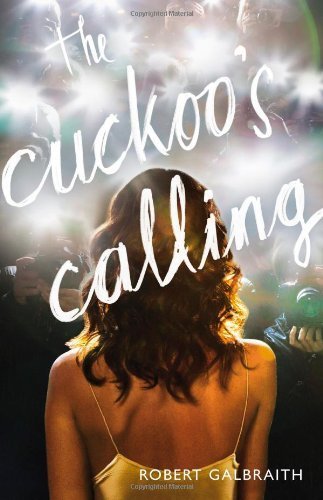
I wish that I could say that I was among the brave, the few who read The Cuckoo’s Calling before pseudonymous author Richard Galbraith’s real identity was revealed. In case you hadn’t heard, the mystery was penned by the best-selling fiction author of the past half-century, J.K. Rowling.
If I had been reading the book in the absence of the knowledge of just who wrote it, a review would have been easy and very pleasant to write: it’s a taut, well-written mystery that does a wonderful job of reviving an all-but-dead genre, the gumshoe detective style mastered by Hammett, Chandler and (on the other side of the pond, and in a very different mode) Sayers. The characters are strikingly, efficiently drawn, the pacing neither too fast nor too slow, the leavening of real humor a pleasant surprise, and the mystery properly mysterious. The main characters — from the victim (a supermodel named Lula — called Cuckoo by her friends — who is supposed to have committed suicide) to the detective and his temporary secretary-cum-sidekick, the characters show real complexity. Rarely do they behave according to type.
Knowing the book was written by the author of the mega-successful Harry Potter books did change my perspective — but just a bit. There are certainly some notes that will be familiar to anyone who read the adventures of Harry & Co. The detective has the wonderfully Dickenian, delightfully Rowling-esque name of Cormoran Strike. There’s a wealth of sly social commentary, and a familiar deft hand with quick, vivid character sketches. Like Harry, Strike is an orphan — his single mother’s dead. (It’s hard to feel as badly for a man in his thirties as for an eleven-year-old, but still.) There’s even Rowling’s nostalgia for the West of England; in the Harry Potter books, the Weasleys, Harry’s adoptive family, live in Devon, as do the aunt and uncle with whom Cormoran and his sister took refuge. (And of course, it was difficult to read the description of Strike in the first chapter and not think of him being played by Robbie Coltrane — aka Hagrid.) His sidekick is a fastidious, meticulous, but surprisingly resourceful young woman (Robin!).
The negatives are few. On a couple of occasions I wanted to hit Strike over the head for not seeing something that I — and most other readers, I assume — could see plainly. I was also a bit annoyed when it became clear that he had solved the mystery — but wouldn’t tell anyone. He spends the first two thirds of the book in a severe funk; his transformation as we head down the home stretch feels a bit forced. And while I loved the solution to the mystery, the psychology behind the crime — and, even more so, to its aftermath — still seems like a bit of a stretch to me.
Nonetheless, Comoran Strike ably carries the mantle of Sam Spade, Phillip Marlowe and Peter Wimsey (well, Wimsey’s mantle is ermine, but he wore it sleuthin’ even so). I look forward to following his further adventures.
As a writer, publisher, and editor, the thing that I find both reassuring and depressing about l’affaire Galbraith is that it showed just how difficult it is — even with a very good, very well reviewed book — actually to get yourself a best-seller, unless you have a lot of luck or the kind of platform that J.K. Rowling has, and that very few other authors could even dream of. The Cuckoo’s Calling was published by a first-rate commercial publisher, was given excellent press, had a great response from both professional reviewers and folks on sites like Goodreads — and was sitting at an Amazon ranking of about 5000 on the day that the news of Rowling’s authorship broke. At a guess, I’d say that a ranking like that indicates daily sales through America’s various commercial booksellers of about ten copies a day. Definitely respectable, but not leaping off of the shelves by anyone’s measure.
Long Gone Daddies Trivia Contest

Consider yourself a fan of blues music, rockabilly, or roots rock? Here’s your chance to strut your stuff, and possibly win a copy of a blues-tinged audiobook at the same time!
John F. Blair Publishers, who put out David Wesley William’s Long Gone Daddies, are holding a trivia contest at the Long Gone Daddies Trivia Contest! To enter, go to the linked page page and answer as many of the questions as you can (and yes, cheating crowd-sourcing asking for help is just fine). Then send your answers to blairpublishing@yahoo.com. The three entrants with the most correct answers will be awarded a code with which to download a free copy of the Long Gone Daddies audiobook through Audible.com.
And to get you in the mood, here’s a bluesy piece of the audiobook itself:
Long Gone Daddies: Cutting Contest between Elvis vs. Muddy
Good luck! And may the bluest note win!
July 24, 2013
Christina’s World – On Struggle and Story
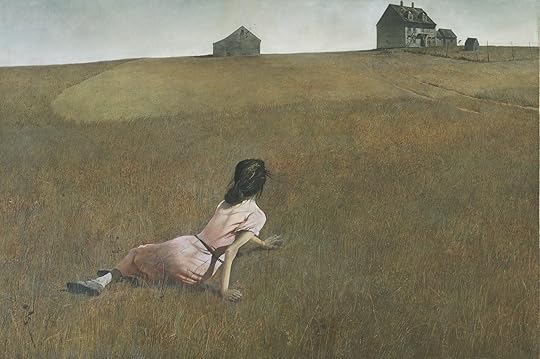 Andrew Wyeth (American, 1917-2009). Christina’s World, 1948. Tempera on gessoed panel. 32 1/4 x 47 3/4 in. (81.9 x 121.3 cm). Purchase. Courtesy of The Museum of Modern Art, New York. © Andrew Wyeth
Andrew Wyeth (American, 1917-2009). Christina’s World, 1948. Tempera on gessoed panel. 32 1/4 x 47 3/4 in. (81.9 x 121.3 cm). Purchase. Courtesy of The Museum of Modern Art, New York. © Andrew WyethI was talking with an author the other day. We were discussing cover art, and the subject of Andrew Wyeth’s iconic painting “Christina’s World” came up.
Not that we wanted to use that piece, but we wanted to evoke the same feeling.
What’s so evocative about “Christina’s World”? Well, I’m not an image person so much as a story person, and for me, it’s the central figure’s determination, her yearning.
The actual Christina — the model for the body (though not the head) in the painting* – was a paraplegic who refused to use a wheelchair; she moved around the farm that she and her brother lived on solely through the use of her arms.
Why were we discussing this? Well, obviously, its an incredibly evocative image. More to the point, Nicole Sykes, the author I’m working with, was born with cerebral palsy. Speech is a challenge for her. She has partial control over her left hand, but doesn’t use her right. Her mobility is provided by a motorized wheel chair. She speaks — and writes — by tapping a large keypad with the back of her left fist; speech is synthesized in Stephen Hawking-like bursts.
And she’s written a memoir. A funny memoir.
It takes me a huge effort of will to write, even on good days. If I had to do it with only the use of one hand — and the back of the hand at that? I can’t imagine it. I’m awed by Nicole’s determination. Like Christina’s determined yearning in Wyeth’s painting, Nicole’s determination moves me.
And — me being me – that got me thinking about heroic narrative.
The classic epic sagas — Gilgamesh or Beowulf — feature heroes who barely seem to break a sweat. They impose their will on the world around them, and trumpet their own prowess. Even when — in each of those tales — the hero runs up against the insurmountable obstacle of death (Beowulf, his own; Gilgamesh, that of his friend Enkidu), he faces it head on, shoulders square.
When I read those classics as a student, I found them vaguely dissatisfying. It wasn’t until my daughters read them that I realized that the problem is that there is no struggle for these heroes. Oh, they battle, but really? The reader (or listener) never really worries for them.
Odysseus, on the other hand, struggles. His plans are constantly dashed — often literally — on the rocks. He is attacked, seduced, captured… And yet what he really wants is to return home. Even when he’s happily shacked up with the demigoddess Calypso, he wanders down to the shore, staring off toward Ithaca, toward Penelope and Telemachus.
I know I’m not alone in finding that a more compelling story. To be human, to be alive, one must struggle. For a story to compel us, it must feature both a desire — what actor’s call an objective — and an obstacle to that desire.
The desire can be epic — to return home after war through a sea of monsters and nymphs — or it can be heroic on a smaller scale — to tell a story without the use of a mouth or fingers. Either way, the desire and the will to achieve it make the story worth reading.
June 30, 2013
Of Ebooks and Audio and Editing
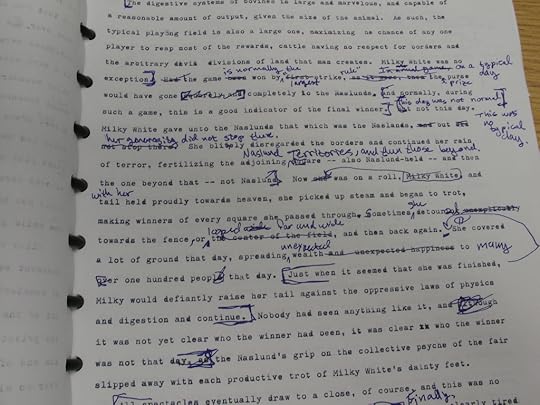
Self-publishing doesn’t mean having to do everything by yourself!
Stillpoint Digital Press is proud to serve not only as a publisher of fine ebook, audiobook, and print editions, but also as a provider of quick, affordable, and professional ebook conversion and design, audiobook production, and editorial services.
We have helped small presses, agencies, and self-publishers to produce the books they want to create, and we’d love to work with you!
Contact us for an estimate today. For more information about our services, read on:
Ebook Conversion and Design
If you are looking to self-publish, but need some help converting your manuscript into a polished, professional ebook format, Stillpoint Digital Press can provide whatever level of assistance you are looking for.
Manuscripts: $2.00–$10.00+ per thousand words
The cost of converting your book depends on the style and complexity of your book, and on the format of the original manuscript.For a straightforward conversion of a simple text (a novel, for example, or a non-fiction book with no figures, tables, or illustrations) we generally charge around $2.00 per thousand words ($0.002 per word, if you’re feeling precise).
More complex formatting (drop capitals, sidebars, illustrations, tables, graphs, multiple images) will increase the time and therefore the cost, depending on the density and complexity of the formatting involved. A heavily illustrated book with a cross-linked list of images might cost $10.00 per thousand words or more.
We can work from just about any original format, from typed manuscript to a computer document. We love it when books come to us as Microsoft Word (.doc/docx), Rich Text (.rtf), Apple Pages (.pages), or OpenOffice (.odt) files, or as InDesign documents (.indd/indb). We can even open most older word processing documents — just let us know!
Some formats require a lot more preparatory work simply to begin the ebook design. That handwritten novel manuscript, for example, or hard-bound printed book will need to be digitized, and PDF files may need to be cleaned up considerably. If you would like us to work from such originals, we’ll be happy to let you know the cost of preparing the manuscript up front as part of our estimate.
Picture books (fixed-format): $10.00–$15.00 per page
For children’s picture books, we can help you convert the manuscript and the art into a fixed-format picture book. The cost of conversion will depend on the complexity of the layout. Ask about adding a read-along track as well! (See information about audiobooks below.)
Covers: $50.00–$400.00
For text conversions, we will provide at no additional charge a basic cover that includes the title, the author’s name, and any image that you have the rights to.
If you would like help designing a more eye-catching cover, we would be happy to provide a quote for our services.
Audiobook Production
Our studio includes a professional audio recording and editing facility. If you would be interested in creating an audiobook or read-aloud track of your work read by a professional voice actor or actors, let us know and we can include that in your quote.
The cost will vary widely depending on the length and complexity of your manuscript. Generally, we charge between $200 and $400 for each finished hour of the completed recording. An hour of edited audio will typically correspond to eight to ten thousand words.
We can give you the final, edited audio files, or, if you would like, we can distribute your audiobook on iTunes, Amazon, and Audible.
Editorial Services
We have decades of experience providing a broad spectrum of editorial services. Whether you need a deep developmental edit that smooths out the logic, language, and flow of your manuscript, a copy edit that polishes its style, or a thorough final proofread that buffs the prose to high shine, we can make sure that your words have precisely the impact that you are looking for.
We also offer services including fact checking, desktop publishing, web design, indexing, and the research and acquisition of permissions for both images and quotations.
Rates vary depending upon the service and the manuscript. In general, we follow the Editorial Freelancers Association’s posted rates.
Contact us
Interested in any of our services? Contact us today at editor@stillpointdigital.com! Let us know what you’re looking for, and we’ll be happy to help you turn your manuscript into a professional, polished book
Art: “Revising, reworking, removing” by mpclemons/flickr.com. Used under a Creative Commons license.
Because no two writers format manuscripts in precisely the same manner, we estimate by word count rather than by pages. A typical page, set in 12 pt. Courier with 1″ margins, will have on average 250 words, so a thousand words works out to about four pages.
June 28, 2013
At Play in the Fields of the Lord: Stillpoint to release Gods & Games
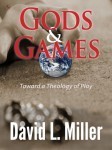 Stillpoint is proud to announce the signing of David L. Miller’s classic title, Gods & Games: Toward a Theology of Play. A deeply thoughtful, deeply irreverent look at the mythology of play, Gods and Games ties together Joseph Campbell’s approach to myth and religion with Johan Huizinga’s view of our species as Homo ludens — “Man the Game-player” — which suggests that play is a central aspect of the human spirit and human culture.
Stillpoint is proud to announce the signing of David L. Miller’s classic title, Gods & Games: Toward a Theology of Play. A deeply thoughtful, deeply irreverent look at the mythology of play, Gods and Games ties together Joseph Campbell’s approach to myth and religion with Johan Huizinga’s view of our species as Homo ludens — “Man the Game-player” — which suggests that play is a central aspect of the human spirit and human culture.
Publishers Weekly called Gods and Games “a comprehensive and clear review…. loaded with quotations both pertinent and entertaining that may be eye-openers both to traditional religionists and readers who may never have thought about play in a philosophical or religious sense.”
Stillpoint Digital Press will release Gods and Games this August in ebook form (ePub and .mobi/Kindle). It will be available initially at Stillpoint’s own online store.
David L. Miller is the Watson-Ledden Professor of Religion, Emeritus, at Syracuse University and is a retired core faculty member at Pacifica Graduate Institute in Santa Barbara. He has served as a long-term member of the board of Joseph Campbell Foundation. Since 1963, Dr. Miller has worked at the intersections of religions and mythologies, literature and literary theory, and depth psychology.
June 14, 2013
June 7, 2013
Long Gone Daddies hits the road
 John F. Blair Publishers have approved the Stillpoint Digital audiobook production Long Gone Daddies, narrated by David Kudler. A real departure from our earlier releases, David Wesley Williams’s twelve-bar blues of a novel is an exploration of love, fame, and the roots of song. Oh — and fathers and sons, as the name implies.
John F. Blair Publishers have approved the Stillpoint Digital audiobook production Long Gone Daddies, narrated by David Kudler. A real departure from our earlier releases, David Wesley Williams’s twelve-bar blues of a novel is an exploration of love, fame, and the roots of song. Oh — and fathers and sons, as the name implies.
Publishers Weekly said, “This lyrical multi-generational musician’s tale marks veteran newspaperman Williams’s impressive first novel. . . . The historical backdrop, including a cameo by young Elvis as a busboy, adds delightful texture and rich depth to Williams’s fictional account of the early days of rock ‘n roll.” Foreword Reviews called it “a bluesy, smoke-tinged story of a man, his guitar, and the family lore that haunts and threatens to dismantle his future…At once dreamy and wild, a churning, soul-searching trip into the root of music making. Readers will find in this novel an immersive and imaginative experience.”
The book should be available for purchase in another couple of weeks, but in the mean time, here’s a taste:
Download: Long-Gone-Daddies-SAMPLE.mp3
Long Gone Daddies
Narrated by David Kudler
Keep an eye out for more news!
June 2, 2013
Seven Deadly Myths and Three Inspired Truths About Book Editing

I originally wrote this as a guest post for Joel Friedlander’s wonderful self-publishing resource site TheBookDesigner.com; it sparked a lot of great conversation and feedback, and it occurred to me that the information might be of interest to a more general readership. If you’ve ever groaned at typos, continuity errors, plot holes or just plain bad writing in a book or blog post, here’s my prescription:
I’ve edited lots of books — children’s books, fantasy, memoirs, self-help, textbooks, and especially books about myths. Myths? I like myths. Heck, I love myths — if we’re talking about myths as “great poems, [that] point infallibly through things and events to the ubiquity of a presence or eternity that is whole and entire in each.”*
If we’re talking about myths in the more negative sense of “untruths,” however, I like them less — especially if they’re myths about my profession and vocation.
Myths and Misinformation about the Editing of Books
There’s a lot of misinformation and misunderstanding about editors and what they do. Here are seven of those myths that I’d like to clear up:
Myth #1: A good writer doesn’t need an editor.
In these days of self-publication and “service” publishers — who take a percentage of sales for letting the author do all of the work — you hear this a lot. “I’ve slaved over this manuscript for years. I checked it through a hundred times. Microsoft Word’s Spelling and Grammar comes up clean. It’s ready for publication.”
Want an example of a professional book from a world-class author who convinced her publishers to put out the book as-is, without a deep developmental edit (see #3 below)? Look at J. K. Rowling’s Harry Potter and the Order of the Phoenix. Pretty good book, and it’s sold millions of copies, absolutely — but it’s at least a hundred pages longer than it needs to be. There’s needless repetition, uneven pacing, and side-plots that go nowhere. You’ll notice that the previous and subsequent books in the bestselling series were much shorter and much tighter. Rowling worked more closely with her editors.
Here’s the fact: if you want your book to be strong, clean, professional, and appealing, for it to affect the readers as you want it to affect them, you need to have it professionally edited. There’s never been a text written that didn’t need editing. By the time you’ve spent weeks, months, or years on a project, you can’t see the words any more. You can see the ideas — the concepts, arguments, plot, and characters — but not every word that’s on the page, or that isn’t, or where there are gaping holes in logic or jumps in style. An editor will. It’s what they’re paid to do.
Myth #2: I don’t need the expense of paying an editor. I had my wife/dad/neighbor/high-school English teacher read it through, and they didn’t find anything.
There’s no doubt that the more eyes you run your manuscript past the better. Those readers know you and love you; that’s a wonderful thing, but it’s a disadvantage as well.
A professional editor’s primary connection to the book is the manuscript itself. Your friends are all going to give you wonderful support and advice (especially that English teacher, for whom I hope you made cookies), but they’re not going to approach the text with the kind of eye for detail that an editor brings.
Myth #3: All editors are the same.
No. There are a variety of editing tasks that need to be addressed as a book goes through the publishing process, each of which requires a different set of skills:
Developmental editors work with the author to craft the manuscript, looking at structure and argument in non-fiction or plot and character in fiction. (In traditional publishing, these are usually the acquiring editors.)
Line or substantive editors also look at the manuscript as a whole, but generally don’t work as closely with the author and aren’t expected to edit as deeply. (This and the previous category are sometimes lumped together as substantive editing.)
Copy editors concentrate on the language or copy. They focus on trying to make the style of the manuscript clean and consistent.
Proofreaders are usually the last folks who look at a book, in galley or proof form, as it’s about to go off to be printed (or, in the case of ebooks, as it’s about to enter distribution). They’re looking purely for misspellings or errors in style, such as improper punctuation, grammar or formatting .
That’s not even to mention the army of other professionals who will probably be needed in order to craft a book out of a manuscript, from layout and cover designers to fact checkers, permissions researchers and the rest.
One editor might provide many of those functions, but not all at once. (See #6 below).
Myth #4: An editor is an editor — so I should just find the cheapest one I can.
It’s your work and your money; you should budget what you can afford in order to create the book that has the impact you’re looking for. As I mentioned above there are different kinds of editors who have different skills, and different kinds of editing demand different commitments of time and energy, so cheap isn’t necessarily better. I’m going to charge a lot more to do a long-term, deep, developmental edit (where I am working with the author to improve the manuscript at the fundamental level) than I will for a simple just-before-publication proofread (where I’m just looking carefully for punctuation, grammar, and style issues).
In addition to marking it up, a good substantive or developmental editor will make lots of queries (questions for the author) on the manuscript, where a copy editor will mostly clean up the language as-is, and a proofreader is usually purely focused on correcting any errors of usage or formatting. These are different approaches to your work.
As with any other service, you get what you pay for.
Myth #5: Okay, fine. I’ll hire an editor. It’s like calling a taxi; take the first one you flag down.
The best way to hire the right editor is probably to talk to any other writers you know and ask for recommendations. You could also look for a local freelance board or service or an online service such as Elance.com. I’d encourage you to look locally first; you don’t need to be able to meet the editor face-to-face, but it doesn’t hurt, especially if it’s a longer-term project.
Get some candidates, tell them exactly how long the manuscript is and what kind of edit you are looking for (see #3 above), and give them a short sample — five to ten pages should do. Ask them to edit it and give you a quote for the whole project, as well as an idea of how long it would take them. You might also ask them if there’s a particular style manual they like to use.
Most likely, no two will edit it exactly the same way, or give you the same quote or time frame. Choose the one you feel did the best job with your prose, asked the most insightful questions, and is within your time and financial limits.
Myth #6: I hired an editor who worked with me for months to rewrite the manuscript. Now it’s ready for publication!
Well… maybe. What I said above about fresh eyes? That holds for editors too. If I’ve been working with an author on a manuscript for a long time, there comes a point where I too become blind to the details.
So if you’ve hired me to do a developmental edit, I may strongly suggest that you work with a copy editor before the book gets laid out — and then, once your magnum opus is in its final format, a proofreader as well.
Myth #7: The editor marked up my manuscript, but I have no idea what the notes are about. Diction? Series commas? The editor is making it up!
Honestly, truly, no. We all cringe instinctively at the sight of our words marked in red, a habit instilled during our school days. But those marks the editor made aren’t criticism. An editor’s first job is to create the best book possible out of your manuscript. You’re paying for the editor’s professional judgment. Welcome it — but if you honestly disagree with or don’t understand a change, let the editor know and ask for the rationale.
The editor should be able to tell you that rationale. He or she was most likely trying to make the prose in your manuscript consistent with a standard. They almost certainly are working with a specific style manual whether it’s The Chicago Manual of Style, The New York Times Manual of Style, The MLA Manual, or even just Strunk and White’s Elements of Style. There should be a dictionary that you can agree on. (I had a problem with an English proofer once who inserted Us into words like color, flavor, etc. even though she’d agreed to proof the book against the US Webster’s Unabridged Dictionary.)
Most of all, the editor will have been trying to make the manuscript consistent — to the standard, but especially to itself.
So, no. Your editor is not making it up.
But There Are Truths, Too, Not Just Myths
And here, just to round things out, are three truths about editors:
Truth #1: Editors love books.
Really. They do. Trust me — we don’t get into the business for the money or the fame. We become editors because we love words and we love books: books as objects, books as art, books as treasure boxes of the human mind and spirit.
We’re editing your book because that’s our job, and because we care about it.
Truth #2: Editors (mostly) love authors.
Most editors are — or wish they could be — authors. There isn’t an editor alive who hasn’t at least tried to walk the creative path you are treading. We have enormous sympathy for the challenges of expressing yourself in words. So if we occasionally ask more than you think we should, it isn’t because we don’t care; it’s because we care too much.
Truth #3: Editors can help you to create the book you dream of creating.
You are writing a book because there is something you have to say, some knowledge or wisdom to impart, some experience to which you want to lead the reader.
An editor is your partner in making that happen, helping you to say precisely what you want to say in the most effective, affecting way possible.
What are your thoughts on editing, self-editing, writing, and publishing? I’d love to hear them!
*Joseph Campbell, Myths to Live By, ebook edition, (Mill Valley, California: Joseph Campbell Foundation & Stillpoint Digital Press, 2010)
For more information about Stillpoint Digital Press’s editorial services, see What Can Stillpoint Do For You?
Art: “Revising, reworking, removing” by mpclemons/flickr.com. Used under a Creative Commons license.
Originally published on TheBookDesigner.com



